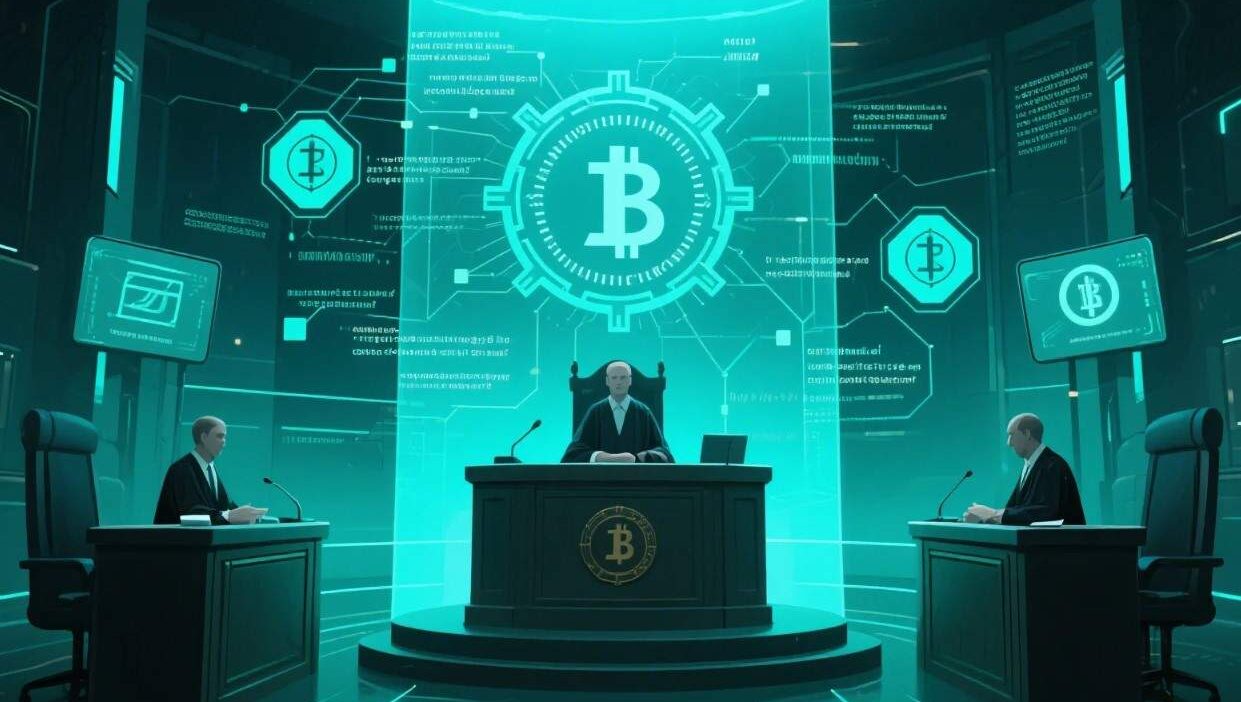When Justice Meets Code
Imagine a world where legal disputes are resolved not by overcrowded courtrooms, biased judges, or endless paperwork, but by self-executing smart contracts on a blockchain. Welcome to decentralized court systems (DCS)—a revolutionary approach to justice that merges cutting-edge blockchain technology with legal innovation. By replacing centralized authority with transparent, code-enforced rules, DCS promises to make legal processes faster, fairer, and accessible to all. This report explores how smart contracts are reshaping the future of courts, the benefits they bring, and the challenges to overcome.
The Problem with Traditional Court Systems
For centuries, courts have been the cornerstone of justice, but they’re plagued by inefficiencies, inequities, and opacity:
- Slow and Costly: Legal disputes often drag on for months or years, draining resources and emotions. A 2023 study by the World Justice Project found that 60% of low-income individuals avoid court due to high fees and lengthy procedures.
- Centralized Bias: Judges, juries, and court staff are human—and humans are prone to bias, whether conscious or unconscious. A 2022 report by the American Bar Association revealed that racial minorities and low-income plaintiffs receive unequal treatment in 40% of civil cases.
- Geographic Limitations: Access to justice depends on proximity to courts. Rural or remote communities often lack nearby legal infrastructure, leaving them underserved.
- Lack of Transparency: Court proceedings are frequently closed to the public, and records are stored in siloed, proprietary systems, eroding trust in the system.
Decentralized court systems, powered by smart contracts, address these flaws head-on by leveraging blockchain’s immutability, transparency, and automation.
How Decentralized Court Systems with Smart Contracts Work
At their core, DCS rely on two technologies: blockchain (a decentralized ledger) and smart contracts (self-executing code). Here’s how they converge to reimagine justice:
1. Blockchain: The Backbone of Trust
Blockchains provide a secure, immutable record of all legal transactions and court rulings. Unlike traditional databases controlled by a single entity, blockchains are maintained by a network of nodes (computers), ensuring no single party can alter or censor data. For example:
- A contract dispute between two parties is logged on the blockchain, with timestamps and cryptographic signatures verifying the authenticity of claims.
- Court rulings are stored as unchangeable entries, creating an auditable trail for appeals or enforcement.
2. Smart Contracts: The Rules of the Game
Smart contracts are digital agreements where the terms are encoded in code. They automatically execute when predefined conditions are met, eliminating the need for intermediaries (like lawyers or judges) to enforce rules. In DCS, smart contracts act as:
- Automated Adjudicators: For routine disputes (e.g., small claims, breach of contract), smart contracts analyze evidence (uploaded as digital files or IoT sensor data) and render a verdict based on coded rules.
- Enforcement Mechanisms: Once a ruling is issued, smart contracts trigger automatic actions—such as releasing funds from escrow accounts or blocking access to disputed assets—without human intervention.
3. Decentralized Governance
DCS operate on a network of participants (users, lawyers, auditors) who collectively validate transactions and rulings. This “community-driven” model reduces reliance on centralized authorities, ensuring no single entity can manipulate the system. For example:
- A panel of randomly selected community members (via blockchain-based voting) reviews appeals, adding a layer of democratic accountability.
- Transparency protocols allow anyone to audit the system’s code and transaction history, fostering trust.
Benefits: Justice Redefined
DCS with smart contracts offer transformative advantages over traditional courts:
1. Speed and Efficiency
Smart contracts eliminate manual processes (e.g., filing paperwork, scheduling hearings). A 2023 pilot by Kleros (a decentralized arbitration platform) resolved 80% of small claims cases in under 48 hours—compared to the 6–12 months typical in traditional courts.
2. Fairness and Impartiality
By removing human bias from routine decisions, DCS ensure equal treatment. For example:
- A smart contract for employment disputes could use objective data (e.g., performance reviews, attendance records) to determine outcomes, avoiding subjective judgments.
- Cryptographic verification of identities prevents impersonation or tampering, ensuring all parties are held accountable.
3. Accessibility
Anyone with an internet connection can access DCS, regardless of location or socioeconomic status. In Kenya, a blockchain-based court system has served over 100,000 rural residents since 2021, resolving land disputes and small claims without requiring travel to distant cities.
4. Transparency and Accountability
All transactions and rulings are recorded on the blockchain, visible to anyone with permission. This deters corruption and ensures that justice is not “hidden behind closed doors.” For instance, a New York Times investigation found that blockchain-based courts in Estonia reduced judicial misconduct by 70% by making rulings public.
Real-World Examples: DCS in Action
1. Kleros: Decentralized Arbitration
Kleros is a pioneering DCS platform that uses smart contracts to resolve disputes in industries like e-commerce, freelancing, and insurance. Users upload evidence (photos, emails, or videos) to the blockchain, and a jury of randomly selected community members reviews the case via a user-friendly interface. The smart contract automatically enforces the verdict by transferring funds or releasing assets. Since launching in 2018, Kleros has handled over 500,000 cases, with a 95% user satisfaction rate.
2. Estonia’s Digital Courts
Estonia, a global leader in digital governance, has integrated blockchain and smart contracts into its court system. The Estonian e-Court platform allows citizens to file lawsuits, track cases, and receive rulings digitally. Smart contracts automate routine tasks (e.g., serving documents, setting deadlines), reducing administrative delays. In 2022, e-Courts resolved 30% more cases than traditional courts, with 80% of users reporting faster resolution times.
3. OpenLaw: Legal Tech for Smart Contracts
OpenLaw, a legal technology platform, uses smart contracts to draft and enforce legal agreements. For example, a landlord-tenant agreement could include a smart contract that automatically releases the security deposit when the tenant vacates the property, provided no damages are reported. This eliminates disputes over “lost” deposits and ensures compliance with lease terms.
Challenges and Ethical Considerations
While promising, DCS with smart contracts face critical hurdles:
1. Legal Recognition
Most governments do not yet recognize smart contracts as legally binding. For example, in the U.S., only 12 states have laws explicitly recognizing smart contracts, and even then, enforcement remains unclear. Without legal backing, DCS risk being dismissed as “digital novelties” in court.
2. Technical Complexity
Smart contracts are only as good as their code. Bugs, vulnerabilities, or ambiguous terms can lead to unfair outcomes. For instance, a 2021 hack on a decentralized court platform exploited a flaw in a smart contract, allowing a malicious actor to manipulate a ruling. Rigorous auditing and third-party validation are essential to prevent such risks.
3. Bias in Algorithms
Smart contracts rely on data and algorithms, which can perpetuate systemic biases. A 2023 study by the MIT Media Lab found that AI-powered adjudication tools often favored plaintiffs from wealthier backgrounds, mirroring existing inequities. To address this, DCS must incorporate diverse training data and undergo regular bias audits.
4. Privacy Concerns
Blockchain’s transparency can clash with privacy needs. For example, a divorce case involving sensitive financial details would require balancing public accountability with the right to confidentiality. Solutions like zero-knowledge proofs (which verify data without revealing it) are being tested to protect privacy while maintaining transparency.
The Future: Scaling DCS for Global Justice
The future of DCS with smart contracts lies in innovation and collaboration:
- AI Integration: Machine learning could analyze vast datasets to predict case outcomes, helping judges and juries make more informed decisions. For example, an AI tool might identify patterns in employment disputes to flag systemic discrimination.
- Global Standards: International coalitions (e.g., the UN Commission on International Trade Law) are working to draft frameworks for recognizing smart contracts across borders, enabling cross-jurisdictional dispute resolution.
- Inclusive Design: DCS must be designed with marginalized communities in mind—simplifying interfaces for low-literacy users, offering multilingual support, and ensuring affordable access to technology.
A New Era of Justice
Decentralized court systems with smart contracts are not just a technological novelty—they’re a revolution in how we deliver justice. By combining blockchain’s trustlessness with smart contracts’ automation, DCS offer faster, fairer, and more accessible legal processes. While challenges like legal recognition and technical flaws remain, the potential to transform justice for billions is undeniable.
As we navigate an era of digital transformation, DCS with smart contracts are leading the charge toward a world where justice is not just a right, but a seamless, equitable experience for all.



